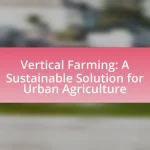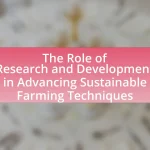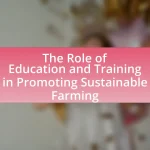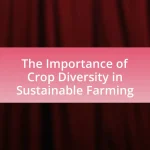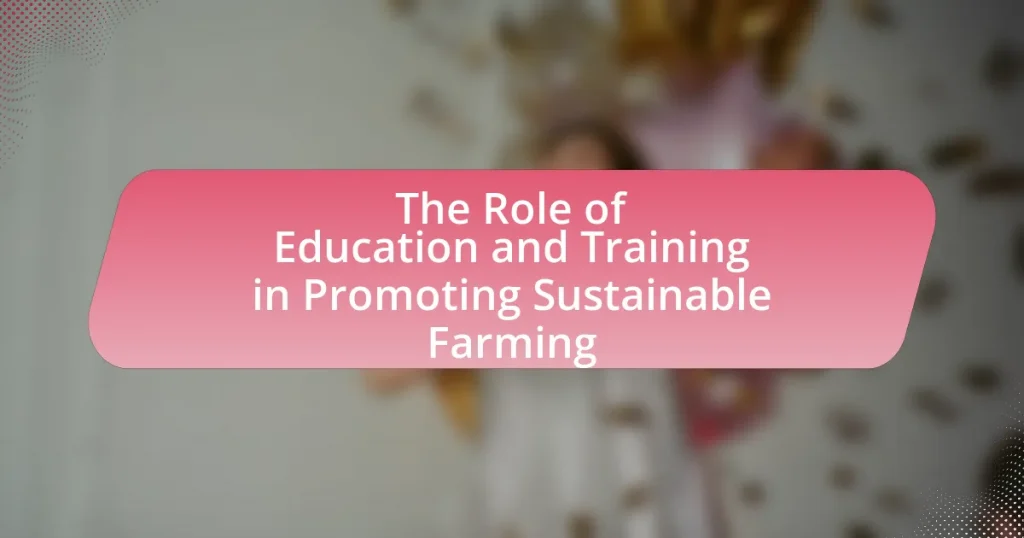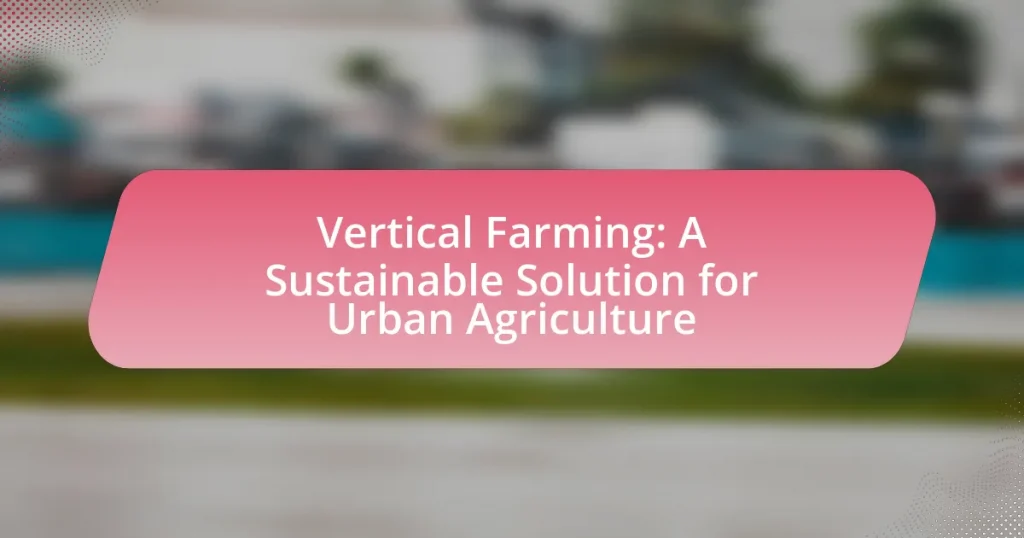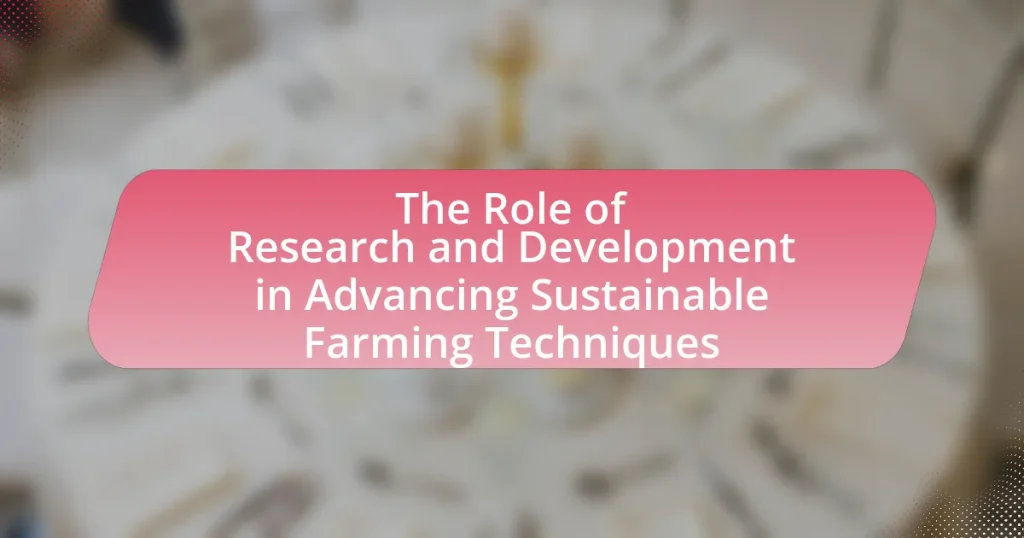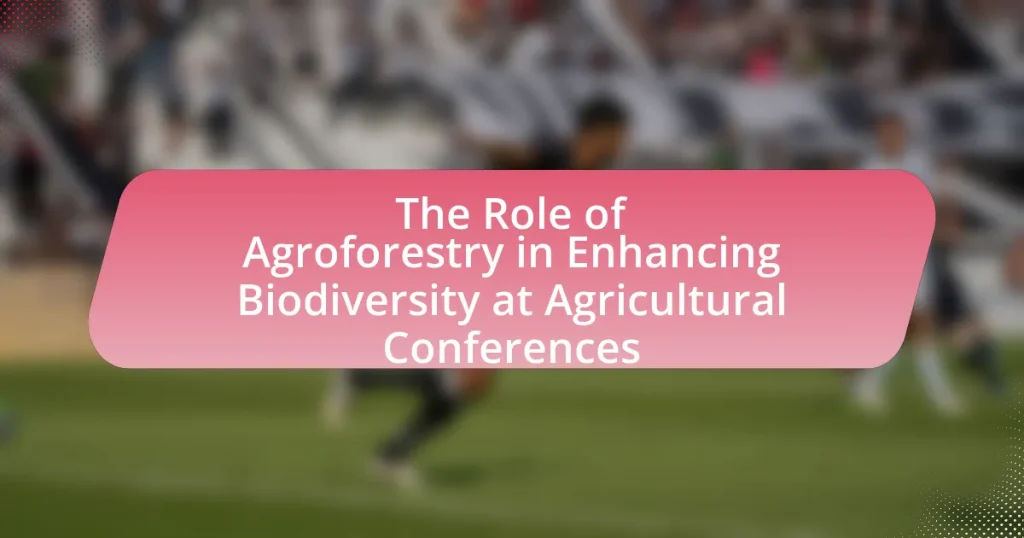Education and training are essential components in promoting sustainable farming practices by providing farmers with the necessary knowledge and skills to implement environmentally friendly techniques. The article explores how educational programs, including workshops and online courses, enhance farmers’ understanding of sustainable practices such as crop rotation, organic farming, and integrated pest management. It highlights the effectiveness of these programs in increasing the adoption of sustainable methods, improving farm productivity, and addressing sustainability challenges. Additionally, the article discusses the importance of tailoring education to local farming communities and integrating technology to enhance learning outcomes, while also addressing the barriers and best practices for effective training in sustainable agriculture.

What is the Role of Education and Training in Promoting Sustainable Farming?
Education and training play a crucial role in promoting sustainable farming by equipping farmers with the knowledge and skills necessary to implement environmentally friendly practices. These educational programs focus on sustainable agricultural techniques, such as crop rotation, organic farming, and integrated pest management, which enhance productivity while minimizing ecological impact. Research indicates that farmers who receive training in sustainable practices are more likely to adopt methods that conserve resources and reduce chemical usage, leading to improved soil health and biodiversity. For instance, a study published in the Journal of Sustainable Agriculture found that farmers who participated in training programs increased their adoption of sustainable practices by 30%, demonstrating the effectiveness of education in fostering sustainable farming.
How does education influence sustainable farming practices?
Education significantly influences sustainable farming practices by equipping farmers with knowledge about environmentally friendly techniques and resource management. Through educational programs, farmers learn about soil health, crop rotation, pest management, and the importance of biodiversity, which are essential for sustainable agriculture. Research conducted by the Food and Agriculture Organization (FAO) indicates that farmers who receive training in sustainable practices are more likely to adopt methods that reduce chemical inputs and enhance soil fertility, leading to improved yields and environmental health. Furthermore, education fosters awareness of climate change impacts, enabling farmers to implement adaptive strategies that promote resilience in their farming systems.
What types of educational programs are available for farmers?
Farmers have access to various educational programs, including workshops, online courses, extension services, and certification programs. Workshops often focus on specific skills such as crop management, pest control, and sustainable practices, while online courses provide flexibility for learning about topics like organic farming and agroecology. Extension services, offered by universities and agricultural organizations, deliver research-based information directly to farmers, enhancing their knowledge and practices. Certification programs, such as those for organic farming, equip farmers with the credentials needed to market their products effectively. These programs are essential for promoting sustainable farming practices and improving agricultural productivity.
How do these programs address sustainability challenges?
These programs address sustainability challenges by equipping farmers with knowledge and skills to implement sustainable practices. For instance, educational initiatives focus on teaching crop rotation, organic farming, and integrated pest management, which enhance soil health and reduce chemical inputs. Research indicates that training programs can lead to a 20% increase in sustainable farming practices among participants, demonstrating their effectiveness in promoting environmental stewardship and resource conservation.
Why is training essential for implementing sustainable farming techniques?
Training is essential for implementing sustainable farming techniques because it equips farmers with the knowledge and skills necessary to adopt practices that enhance productivity while minimizing environmental impact. Effective training programs provide insights into soil health, crop rotation, pest management, and resource conservation, which are critical for sustainable agriculture. Research indicates that farmers who receive training in sustainable practices are more likely to implement them successfully, leading to improved yields and reduced chemical usage. For instance, a study published in the Journal of Sustainable Agriculture found that trained farmers increased their crop yields by an average of 20% while reducing pesticide use by 30%. This evidence underscores the importance of training in fostering sustainable farming practices.
What skills do farmers need to adopt sustainable practices?
Farmers need skills in resource management, ecological understanding, and technology utilization to adopt sustainable practices. Resource management involves efficient use of water, soil, and nutrients to minimize waste and environmental impact. Ecological understanding enables farmers to recognize the interdependence of crops, pests, and soil health, which is crucial for implementing practices like crop rotation and integrated pest management. Technology utilization includes proficiency in modern agricultural tools and data analysis, which can enhance productivity while reducing ecological footprints. These skills are supported by educational programs that focus on sustainable agriculture, demonstrating their importance in promoting environmentally friendly farming methods.
How does training improve farm productivity and environmental impact?
Training enhances farm productivity and environmental impact by equipping farmers with knowledge and skills to implement sustainable practices. Educated farmers can adopt advanced techniques such as precision agriculture, which optimizes resource use and minimizes waste, leading to increased yields. For instance, a study by the Food and Agriculture Organization found that training in sustainable practices can boost crop yields by up to 30%. Additionally, training fosters awareness of environmental stewardship, enabling farmers to reduce chemical inputs and improve soil health, which contributes to biodiversity and ecosystem resilience. This dual focus on productivity and environmental sustainability demonstrates the critical role of education and training in modern agriculture.
What are the key components of effective education and training in sustainable farming?
The key components of effective education and training in sustainable farming include practical knowledge, hands-on experience, and community engagement. Practical knowledge encompasses understanding sustainable practices such as crop rotation, organic farming, and integrated pest management, which are essential for promoting environmental health and agricultural productivity. Hands-on experience allows learners to apply theoretical concepts in real-world settings, enhancing their skills and confidence in implementing sustainable techniques. Community engagement fosters collaboration among farmers, educators, and local organizations, creating a support network that encourages knowledge sharing and innovation in sustainable practices. These components are supported by research indicating that experiential learning and community involvement significantly improve the adoption of sustainable farming methods.
How do hands-on experiences enhance learning outcomes?
Hands-on experiences enhance learning outcomes by facilitating active engagement and practical application of knowledge. When learners participate in hands-on activities, they are more likely to retain information and develop critical thinking skills. Research indicates that experiential learning can improve retention rates by up to 75%, compared to traditional lecture-based methods, which typically yield retention rates around 5-10%. This is particularly relevant in sustainable farming education, where practical skills and real-world problem-solving are essential for effective implementation of sustainable practices.
What role do technology and innovation play in education and training?
Technology and innovation are crucial in education and training as they enhance learning experiences and improve knowledge dissemination. For instance, digital platforms facilitate access to educational resources, enabling learners to engage with content anytime and anywhere. According to a report by the International Society for Technology in Education, 75% of educators believe that technology positively impacts student engagement and learning outcomes. Furthermore, innovative teaching methods, such as blended learning and gamification, have been shown to increase retention rates and motivation among students. These advancements not only make education more accessible but also equip learners with the skills necessary for modern sustainable farming practices.
How can education and training be tailored to local farming communities?
Education and training can be tailored to local farming communities by incorporating region-specific agricultural practices, climate conditions, and crop varieties into the curriculum. This approach ensures that the content is relevant and applicable to the unique challenges and opportunities faced by farmers in that area. For instance, programs can include hands-on workshops that focus on sustainable farming techniques that are proven effective in local environments, such as crop rotation and integrated pest management. Research indicates that localized training increases adoption rates of sustainable practices; a study by the Food and Agriculture Organization found that farmers who received tailored training were 30% more likely to implement new techniques successfully.
What are the specific needs of different agricultural regions?
Different agricultural regions have specific needs based on their climate, soil type, crop selection, and local economic conditions. For instance, arid regions require irrigation techniques and drought-resistant crops, while humid regions may focus on pest management and soil conservation practices. Additionally, regions with diverse crops need education on crop rotation and sustainable practices to maintain soil health. According to the Food and Agriculture Organization, tailored training programs that address these regional characteristics can significantly enhance productivity and sustainability in agriculture.
How can local knowledge be integrated into training programs?
Local knowledge can be integrated into training programs by incorporating community-based practices and insights into the curriculum. This approach ensures that training reflects the specific agricultural conditions, cultural practices, and environmental challenges faced by local farmers. For instance, programs can include workshops led by local experts who share traditional farming techniques that have proven effective in the region. Research indicates that training programs that utilize local knowledge can enhance farmers’ adaptability and resilience, as evidenced by a study published in the Journal of Sustainable Agriculture, which found that integrating indigenous practices improved crop yields by 20% in specific communities.
What challenges do education and training programs face in promoting sustainable farming?
Education and training programs face several challenges in promoting sustainable farming, including limited resources, varying levels of farmer engagement, and the need for updated curricula. Limited financial and human resources hinder the development and delivery of comprehensive training programs, making it difficult to reach a broad audience. Additionally, farmers’ varying levels of interest and commitment to sustainable practices can lead to inconsistent participation in training sessions. Furthermore, curricula often lag behind current agricultural research and practices, resulting in outdated information being taught. These challenges collectively impede the effectiveness of education and training initiatives aimed at fostering sustainable farming practices.
How can funding and resources impact program effectiveness?
Funding and resources significantly impact program effectiveness by determining the quality and reach of educational initiatives in sustainable farming. Adequate funding allows for the development of comprehensive training materials, access to expert instructors, and the implementation of hands-on learning experiences, which are crucial for effective education. For instance, a study by the Food and Agriculture Organization (FAO) highlights that programs with sufficient financial backing can increase participant engagement and knowledge retention by up to 40%. Conversely, limited resources can lead to inadequate training, reduced participant numbers, and ultimately, lower adoption rates of sustainable practices. Therefore, the availability of funding and resources directly correlates with the success and sustainability of educational programs in agriculture.
What barriers do farmers encounter when accessing education and training?
Farmers encounter several barriers when accessing education and training, including financial constraints, geographical isolation, and limited availability of relevant programs. Financial constraints often prevent farmers from affording tuition or associated costs, as many operate on tight budgets with little surplus income. Geographical isolation can hinder access to training facilities, particularly in rural areas where transportation options may be limited. Additionally, the lack of tailored educational programs that address specific agricultural needs further complicates access, as many existing courses may not align with the practical skills farmers require for sustainable practices. According to a study by the Food and Agriculture Organization, these barriers significantly impact farmers’ ability to adopt innovative techniques and improve productivity.
What are the best practices for implementing education and training in sustainable farming?
The best practices for implementing education and training in sustainable farming include integrating hands-on learning experiences, utilizing local knowledge, and fostering collaboration among stakeholders. Hands-on learning allows farmers to apply sustainable practices directly, enhancing retention and understanding. For instance, programs that include field demonstrations have shown to increase adoption rates of sustainable techniques by up to 30%. Utilizing local knowledge ensures that training is relevant and culturally appropriate, which can lead to higher engagement and effectiveness. Collaboration among stakeholders, such as agricultural extension services, universities, and community organizations, creates a support network that enhances resource sharing and knowledge dissemination. Research indicates that collaborative training programs can improve farmer outcomes significantly, as seen in studies conducted by the Food and Agriculture Organization, which highlight the importance of community involvement in educational initiatives.
How can collaboration between stakeholders enhance training programs?
Collaboration between stakeholders enhances training programs by integrating diverse expertise and resources, leading to more comprehensive and effective learning experiences. When agricultural educators, farmers, government agencies, and NGOs work together, they can share best practices, tailor training content to specific community needs, and ensure that the latest sustainable farming techniques are included. For instance, a study by the Food and Agriculture Organization (FAO) highlights that collaborative training initiatives can increase farmer participation by 30%, as they feel more engaged when multiple stakeholders contribute to the program’s design and delivery. This collaborative approach not only improves the quality of training but also fosters a sense of community ownership and accountability, ultimately leading to better adoption of sustainable practices.
What strategies can be employed to ensure ongoing farmer engagement?
To ensure ongoing farmer engagement, implementing continuous education and training programs is essential. These programs can include workshops, online courses, and field demonstrations that focus on sustainable farming practices, which have been shown to improve both knowledge and application among farmers. Research indicates that farmers who participate in educational initiatives are more likely to adopt innovative techniques, leading to increased productivity and sustainability. For instance, a study by the Food and Agriculture Organization found that targeted training can enhance farmers’ skills and confidence, resulting in higher engagement levels and better farming outcomes.
What future trends can we expect in education and training for sustainable farming?
Future trends in education and training for sustainable farming will increasingly focus on integrating technology, such as precision agriculture and data analytics, into curricula. This shift is driven by the need for farmers to utilize advanced tools for efficient resource management and crop monitoring. Additionally, there will be a greater emphasis on interdisciplinary approaches that combine environmental science, economics, and social sciences to address the complexities of sustainable farming practices. Research indicates that programs incorporating hands-on training and community engagement lead to better adoption of sustainable techniques, as evidenced by studies showing improved outcomes in regions where such educational models are implemented.
How might advancements in technology shape future training methods?
Advancements in technology will significantly shape future training methods by enabling personalized learning experiences and enhancing accessibility. For instance, the integration of artificial intelligence can tailor training programs to individual learning paces and styles, improving knowledge retention and engagement. Additionally, virtual reality and augmented reality technologies can provide immersive simulations for practical training in sustainable farming techniques, allowing learners to practice in a risk-free environment. Research indicates that such technologies can increase retention rates by up to 75% compared to traditional methods, demonstrating their effectiveness in education.
What role will policy changes play in the evolution of education and training?
Policy changes will significantly influence the evolution of education and training by shaping curricula, funding, and access to resources. For instance, government initiatives that prioritize sustainable farming can lead to the integration of environmental science and sustainable practices into educational programs. Research from the Food and Agriculture Organization indicates that policy frameworks that support sustainable agriculture education can enhance farmers’ knowledge and skills, ultimately leading to improved agricultural practices and environmental stewardship. Therefore, effective policy changes are essential for aligning educational outcomes with the needs of sustainable farming.
What practical steps can farmers take to enhance their education and training in sustainable farming?
Farmers can enhance their education and training in sustainable farming by participating in workshops and training programs focused on sustainable practices. These programs often provide hands-on experience and access to the latest research and techniques in sustainable agriculture. For instance, organizations like the Sustainable Agriculture Research and Education (SARE) program offer grants and resources that support farmer-led education initiatives. Additionally, farmers can engage with local agricultural extension services, which provide tailored advice and resources on sustainable farming methods. Networking with other farmers through cooperatives or associations can also facilitate knowledge sharing and collaboration on sustainable practices.
